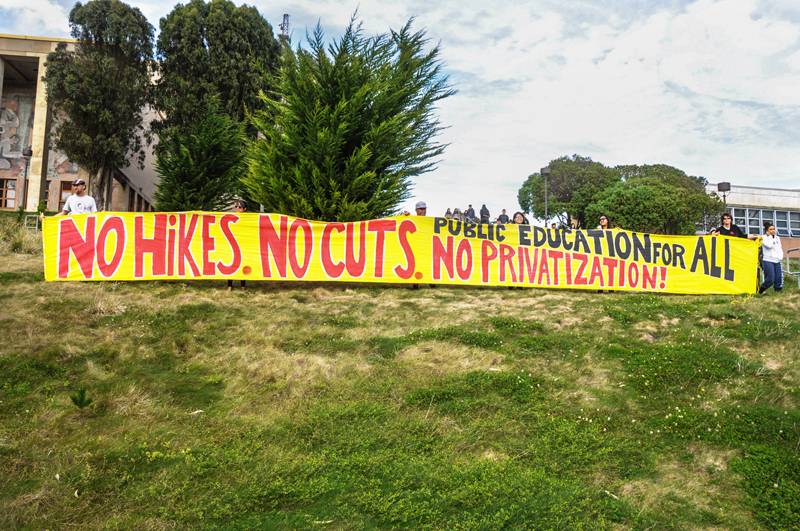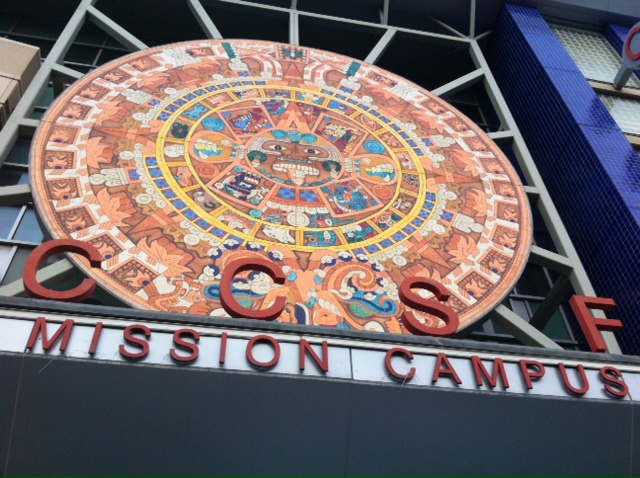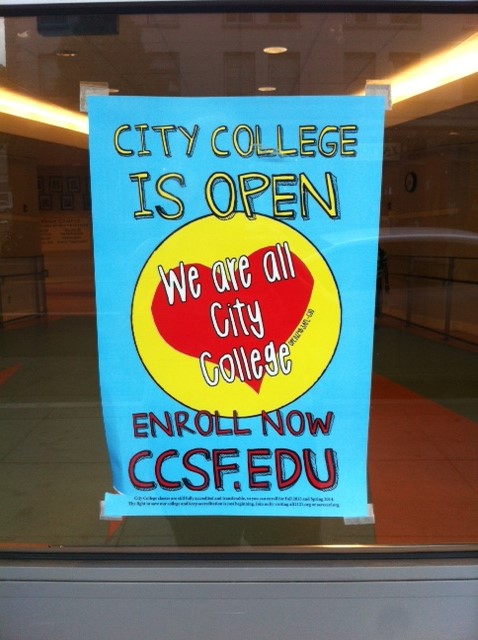Attack on City College SF: Difference between revisions
No edit summary |
No edit summary |
||
| Line 8: | Line 8: | ||
''Photo: Shane Menez'' | ''Photo: Shane Menez'' | ||
{| style="color: black; background-color: #F5DA81;" | |||
| colspan="2" | '''City College, long known for its diversity, activism, inclusiveness and reputation for quality low cost education fell victim to the widespread state mandated budget cuts of 2008. With an enrollment of 85,000 and a large well payed staff the Accreditation Commission for Community and Junior Colleges forced CCSF to make cuts that the community saw as too drastic and unfair to a beloved city institution. Seen as more of a civil rights issue than an education topic, students, faculty and San Franciscans made their voices heard. ''' | |||
|} | |||
Revision as of 13:22, 18 October 2016
Historical Essay
by Molly Hankwitz, September 24, 2013
Students and faculty members rallied at City College of San Francisco’s Ocean campus on Nov. 15 against the consolidation of diversity studies programs. Photo: Shane Menez
| City College, long known for its diversity, activism, inclusiveness and reputation for quality low cost education fell victim to the widespread state mandated budget cuts of 2008. With an enrollment of 85,000 and a large well payed staff the Accreditation Commission for Community and Junior Colleges forced CCSF to make cuts that the community saw as too drastic and unfair to a beloved city institution. Seen as more of a civil rights issue than an education topic, students, faculty and San Franciscans made their voices heard. |
WE, THE PEOPLE
The times they are a-changing. Assessment of City College of San Francisco's accreditation and threat of closure in July 2014 came as an unwarranted attack on the San Francisco community. The ACCJC marched in and took over. The move is still having repercussions as students, faculty and staff struggle to hold on to their college.
CCSF is a diverse, educated, inclusive, intellectual and progressive, nearly socialist, place where anyone can register, take a class; get a low-cost education. How is it possible, then, that CCSF is not meeting standards when it is so widely valued? What would closure do to the exceptional multicultural and educated workforce of SF? How has the College fought back and what is the educational responsibility of the State of California to poor and minority residents?
2008 budget cuts affected California's higher educational institutions through reduced enrollment and loss of services. They took a toll upon CCSF. Pressure on the school now to change its ways or close is harsh after the budget cuts.
Approximately 85,000 students are now currently enrolled at CCSF. It is a democratic institution working to deliver quality education and certification. Many of CCSFs best students are from under-served communities; newcomer, transitional, or older adult residents including indigenous, veterans, seniors, poor women, undocumented workers and newly arrived immigrants.
CCSF is also a robust employer, paying its faculty some of the highest salaries and benefits for public workers anywhere in the nation. State budget cuts affected the CCSF experience despite successful efforts to preserve faculty salaries and many student services. Now, the faculty's pay has been cut. CCSF wore the difficulties of budget cuts and now the ACCJC is being "tough." CCSF is being made to scramble, on its new budget, to fulfill requirements.
Entrance with mosaic at CCSF's new Mission Campus building. Photo: Molly Hankwitz
MORE CONTEXT
Judgments of CCSF may have appeared fair and rigorous due to the authority of the ACCJC and mainstream news reporting. It would all appear an assertive official effort to "clean up" a faltering and unworthy urban institution. But, it's easy these days to send morality plays through the news when education is being debated and reformed as hotly as it is in this country presently. "Crisis" makes for dramatic reading. More astute thinking, however, cannot separate one act of large-scale political indifference from another. These are divisive times politically. From the Tea Party forcing government shutdown to evictions and foreclosures plaguing neighbhorhoods. One must read the swashbuckling neo-liberal moves to destabilize cities, land, economies,and communities as having divisive and conservative similarities.
For one, the CCSF attack is consistent with other backlash targeting minority and lower-income Americans. The Supreme Court's decision on the 1965 Voting Rights Act, the Trayvon Martin verdict, the Tea Party's blockade of Obamacare, corporate and right-wing efforts to push in "states' rights", and the secret, nighttime addition (by Republicans) of limitations to birth control in health care are clear-cut efforts to curtail liberty and equity for all.
Poor countries have been strangled by destabilization. Economies have fallen to enforced "austerity" measures, heavily militarized police action, censorship and violence. Privatization of public assets, the pervasive argument that there is no money without corporate management, has proven extremely successful. In league with media outlets convincing the public that assets must be privately managed and controlled and other economic justifications is relatively simple. We have heard these arguments in K-12 public education, parks and recreation, public transportation and regarding the removal of community-governed farms, libraries and gardens. It started with Bush's "bail out" transaction paid from the tax-payer funded US Treasury and continues with the push towards privatization of higher education.
LAYING BLAME, TAKING ACTION
Interests behind frequently clandestine initiatives, like those used to discredit and restructure CCSF, must be profoundly resisted. Their work undermines progress towards a open, democratic civil society; above all our capacity for free thought and the right to self-representation of populations.
In a singularly well-worded lawsuit, City Attorney Dennis J. Herrera's office has proceeded against the ACCJC for “using the accreditation process to squelch debate with respect to education reform in Sacramento”.(LA Times,2013) Their move sheds light upon the agency's agenda for including CCSF in its already overly-punitive track record of punishing California's community colleges. This commendable insight into the political practices of the ACCJC across the state comes as some welcome relief to an else-wise silent or "on side" City Hall.
RESISTANCE, PROTESTS, SPEAK OUTS
Efforts to resist the attack in the community are vigorous. (See links below.) CCSF has been working to stay open despite the imposition of the ACCJC and its effects upon enrollment. Declining enrollment means more State funding lost. Loss of accreditation would only make that situation worse. This is how the ACCJC's attack is punitive and counter-productive to a school already beset with budget cuts. CCSF needs money to function at anywhere near its past or present level of good. It is being pushed down by the ACCJC. It has been undermined. One Trustee has been appointed to dictate. Held unduly responsible for the State's budget crisis, and the heavy-handed methods of the ACCJC, CCSF needs its students and its support to survive.
Thousands are working to keep CCSF open.
Photo: Molly Hankwitz
MORALE KILLING
Ways in which the attack on CCSF has played out across the community, fall into camps belonging to the neo-liberalized, capitalist media "speak" which has assailed CCSF over and over as fiscally irresponsible and failing to maintain standards. Implications are that CCSF is behind the times, but this argument is transparent. It is an "old and new" argument, preparing for a future of "real" change designated from above, as it were, which will be more up to date. There is no mitigating circumstance or community voice. Public radio and the San Francisco Bay Guardian,however, reliably left wing, promoted community voice, and published how elements of Obama administration rhetoric are to blame for the maneuvering around state and national education. (Bay Guardian editorial, 2013)
Measures to disrupt CCSF's community have hurt. Faculty received eleven percent pay cuts. This was to be prevented by Prop. A. San Franciscan voters wholeheartedly supported Prop. A. Long term teachers' course loads were reduced. Their classes have been renamed and syllabi handed over to younger colleagues with the excuse that attrition rates were at fault. These contract-breaking tactics hold faculty responsible. It is not the faculty's fault or that of a school under financial pressures from State bungling, that enrollment is in decline.
CONFUSION AND UNDERMINING
Threat of closure has felt like robbery, an out and out heist of a public asset by private sector interests, starting with the ACCJC. Ultimately, it's self-representation v. "top down" distanced management with an undisclosed and harmful agenda.
When locks were suddenly changed in classroom buildings without notifying Faculty and staff, the message was clear. The CCSF workforce had come and gone freely for years. In one case a native plant garden, carefully tended by a Native American gardener, was ordered removed to be replaced, the gardener was told, with less overtly cultural landscaping.
The disappearance of departmental chairs, faculty pay cuts, “downsizing“ of student services, and commercialization of the bookstore all happened so quickly, that there was little time to understand, except to understand. It has been as if CCSF is slated for intellectual demolition. Visions of the campuses falling silent dismay a public familiar with San Francisco land grabs and rapid gentrifying elements. The neo-liberal attack, even if the college stays open. It has already disturbed the coherence of the school.
CCSF is not only important to San Francisco but to the Bay Area. Radio talk shows about CCSF's accreditation have callers angry over the effects upon community. One ESL teacher from the East Bay ended a righteous rant about the war on minority students with, ”Oakland has no more adult public higher education.” It was chilling.
CIVIL RIGHTS AND EDUCATIONAL EQUITY ARE A NATIONAL ISSUE
National events in Washington, Florida and elsewhere this year have targeted the public sector, particularly, people of color and the poor. The New York Times reports that 1 in 5 children live in poverty in the United States. (NY Times, 10/1/2013) Income discrepencies show people of color significantly poorer and more unemployed overall than similarly aged white people; approximately 50% of people of color, both African American and Latino, to a mere nine percent of whites. These numbers lend backdrop to the climate of deprivation surrounding dis-accreditation and the threat to CCSF. The school has helped thousands of poorer and minority students, those most likely to use its services, to gain social and political ground through higher education. Where will these students go and what will their future prospects be in a system oppresses them further? Conservative attacks on affirmative action of the 90s have already shown how short sighted some can be when it comes to addressing equity. Is the tactic this time to bleed important institutions dry financially, then attack them further, and force them to close?
SERIES OF ATTACKS
Starting from the top, is the Supreme Court's decision to take down important parts of the 1965 Voters' Rights Act on the thinly laid argument that the racial discrimination leading to this seminal legislation is no longer operative. To be clear, the Voter's Rights Act is a piece of law protecting minorities from discrimination at the polls. Just as Roe v. Wade is a piece of law that enables women to lead their own lives with the right of privacy over their own bodies, the Voter Rights Act protects minority voters' rights to participate in elections. Yet within hours of the Court's decision, racially-divided states set about re-zoning voting districts and drawing boundaries which would substantially affect voter turnout in the future. It is an historic fact and feature of his election that President Obama won states where voter turn out for minority and poor populations was especially high. Has fear of the career success of President Obama helped turned the tables on civil rights from voting to higher education?
The not-guilty verdict in the Trayvon Martin shooting ricocheted across the nation. Fatal wounding of young people of color by those armed and sanctioned to use weapons is being legally protected by the judicial system. This sets a dangerous precedent and constitutes another link in a chain of racist backlash being glossed over in the mainstream media by such ideals as the “Martinizing” of the Obama presidency with its high profile marches on Washington in honor of Dr. Martin Luther King. As Smiley and West have pointed out, sentimentality towards King does little but put frosting on a situation which King himself would have regarded as abhorrent---that is the trading of civil rights laws for ineffectual "feel good" histories as easily forgotten as they are enjoyed. President Obama, while he may be an advocate for affordable health care is no King after all. Martin Luther King was a pacifist, deeply against the Vietnam War, and an activist in that capacity.
What is real, however, is the shape-shifting of top courts and justices, legal maneuveuring legislating inequality, creating new laws around voters' rights, womens' rights, use of lethal weapons, the closing of borders, and the de-waging and under valuation of poor citizens on the basis of race, gender, and income. Where does this growing systemic inequality best take root? Arguably, in attacks on cultures of accessible, affordable education for all. It is here that populations stand to lose the most ground in terms of their access to opportunity, personal growth, prosperity and identity.
THE TOLL
Beleagurement of the other is but one pernicious outcome of chauvanistic ruling power. It is observed in the widespread modeling and adoption of “Stop and Frisk” police methods in New York and Oakland, in the problem of Oscar Grant's shooting death going all but excused, and of “inner city” hatred emerging as far back as the Nixon and Reagan administrations when many urban policing laws were put in place and more disenfranchised people started living in the street.
If you are a person of color and poor, today — even with a half Black president — you can be screwed out of your vote, stopped and frisked without a warrant, and are as likely in 2013 to be the target of police brutality or "acceptable levels" of violence from someone wearing a badge than you ever have been before.
Unfortunately, to my mind, the destruction of CCSF due to a financial explanation and showing little faith in its sustained purpose or public good, is a heartless account fitting right into the current, reactionary cycle of governmental shutdown/control and domination. Most importantly, the attack is a disavowal of the importance of political difference, as Herrera's lawsuit amplifies, of multiple cultures and expressions of culture which make San Francisco and the US, great. It is nearly tantamount, instead, to an act of blind, cultural warfare supported through the justifications of power in a manner similar to that described by Hardt and Negri as the growth of "just wars" under empire.
DOE
In 2009, the Department of Education swept the country with educational imperatives in hand. They held multiple public meetings on minority education in public and charter schools in numerous states including our own at the Main Library in Civic Center. In the Bay Area, attendees, including myself, heard from young Oakland activists of color about the state of Oakland's schools, which when moved from being public to Charter status under the DOE's plans for educational reform, frequently became more whitened and were no longer seen as serving or belonging to minority populations. The activists cited in particular the American Indian Middle School, which “went charter” and lost its community character. Actions such as the people's sit-in at Lakeview Elementary in Oakland 2012, underscore further, the degree of struggle being undertaken to protect public schools from outside "takeover". This is in the context, too, of neighborhoods being gentrified and of the extensive publicity of crime rates and participation in crime from Oakland's black youth. At the same time, it is very important to respond to the fact that if it had not been for the African American press, the Oscar Grant story would probably have disappeared altogether.
SUSTAINABILITY NOT GENTRIFICATION
In the modern history of the United States, the quality of life, and open, free-wheeling civic participation of community in city politics have been progressive values embodied by the city of San Francisco. Residents here, after all, helped to build a radical movement against the Vietnam War in the 1960s, against the invasion of the Gulf in the nineties and Iraq in the 2000s. We have been the first to implement many critical chapters in the history of womens' rights, gay rights, and AIDS research. Occupy SF was a vibrant and challenging chapter in the city's recent political history. Part of this progressive tradition has been the building of CCSF as a deeply engaged institution providing quality low-cost higher education to the lumpen mass without student loan debt.
Copernicus and the Aztecs as inspiration. Muralist: Emanuel Paniagua
Photo: Molly Hankwitz
The point here is to lay bare the consistency of neo-liberal attack strategies, the connection between depriving populations of public assets and other forms of oppression now emerging in the local and national political landscape. Above all, it is to point out the pointlessness of destroying something proven to be an effective resource beneficial to San Francisco residents--an sanctuary for the poor---when with a better set of ideas, it could be prevented.
All citizens deserve the right to higher education! What the responsibility of California's cities is to their populations under seige, regarding this issue in the future, remains to be seen. CCSF should be preserved as the amazing institution it is. It should be saved. It needs our support. It is our College! Our city!
The author wishes to thank Richard Baum for his camaraderie and factual assistance, and Walter Alter for his correspondence and research. She is the initiator of The City College of San Francisco Community History Project (continually being added to Found SF) and seeks to collect stories, photographs, and details about CCSF from the community of San Francisco. She is working on a video installation about City College and urban education for the masses for ATA's window gallery on Valencia Street.
For more information, please contact: mollyhankwitz [at] gmail [dot] com
Notes / City Attorney Files Suit
San Francisco sues Panel over City College Accreditation
Here's Real History in the Making: Fighting to Save City College




